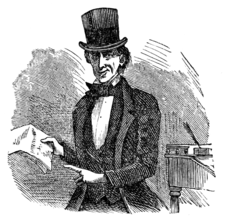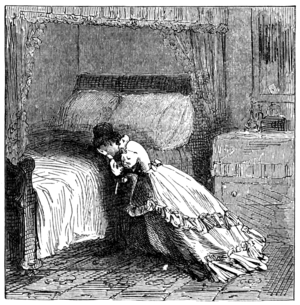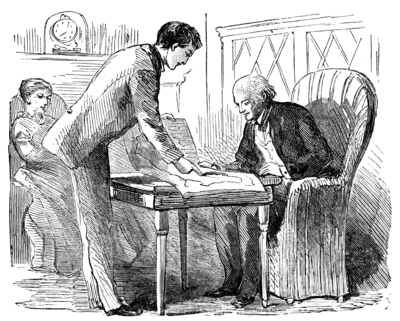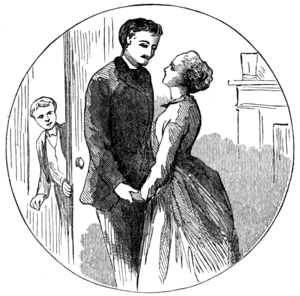The Gilded Age/Chapter 50
CHAPTER L.
IT is impossible for the historian, with even the best intentions, to control events or compel the persons of his narrative to act wisely or to be successful. It is easy to see how things might have been better managed; a very little change here and there would have made a very different history of this one now in hand.
If Philip had adopted some regular profession, even some trade, he might now be a prosperous editor or a conscientious plumber, or an honest lawyer, and have borrowed money at the saving's bank and built a cottage, and be now furnishing it for the occupancy of Ruth and himself. Instead of this, with only a smattering of civil engineering, he is at his mother's house, fretting and fuming over his ill-luck, and the hardness and dishonesty of men, and thinking of nothing but how to get the coal out of the Ilium hills.
If Senator Dilworthy had not made that visit to Hawkeye, the Hawkins family and Col. Sellers would not now be dancing attendance upon Congress, and endeavoring to tempt that immaculate body into one of those appropriations, for the benefit of its members, which the members find it so difficult to explain to their constituents; and Laura would not be lying in the Tombs, awaiting her trial for murder, and doing her best, by the help of able counsel, to corrupt the pure fountain of criminal procedure in New York.
If Henry Brierly had been blown up on the first Mississippi steamboat he set foot on, as the chances were that he would be, he and Col. Sellers never would have gone into the Columbus Navigation scheme, and probably never into the East Tennessee Land scheme, and he would not now be detained in New York from very important business operations on the Pacific coast, for the sole purpose of giving evidence to convict of murder the only woman he ever loved half as much as he loves himself.
If Mr. Bolton had said the little word "no" to Mr. Bigler, Alice Montague might now be spending the winter in Philadelphia, and Philip also (waiting to resume his mining operations in the spring); and Ruth would not be an assistant in a Philadelphia hospital, taxing her strength with arduous routine duties, day by day, in order to lighten a little the burdens that weigh upon her unfortunate family.
It is altogether a bad business. An honest historian who had progressed thus far, and traced everything to such a condition of disaster and suspension, might well be justified in ending his narrative and writing—"after this the deluge." His only consolation would be in the reflection that he was not responsible for either characters or events.
And the most annoying thought is that a little money, judiciously applied, would relieve the burdens and anxieties of most of these people; but affairs seem to be so arranged that money is most difficult to get when people need it most.
A little of what Mr. Bolton has weakly given to unworthy people would now establish his family in a sort of comfort, and relieve Ruth of the excessive toil for which she inherited no adequate physical vigor. A little money would make a prince of Col. Sellers; and a little more would calm the anxiety of Washington Hawkins about Laura, for however the trial ended, he could feel sure of extricating her in the end. And if Philip had a little money he could unlock the stone door in the mountain whence would issue a stream of shining riches. It needs a golden wand to strike that rock. If the Knobs University bill could only go through, what a change would be wrought in the condition of most of the persons in this history. Even Philip himself would feel the good effects of it; for Harry would have something and Col. Sellers would have something; and have not both these cautious people expressed a determination to take an interest in the Ilium mine when they catch their larks?
Philip could not resist the inclination to pay a visit to Fallkill. He had not been at the Montague's since the time he saw Ruth there, and he wanted to consult the Squire about an occupation. He was determined now to waste no more time in waiting on Providence, but to go to work at something, if it were nothing better than teaching in the Fallkill
Seminary, or digging clams on Hingham beach. Perhaps he could read law in Squire Montague's office while earning his bread as a teacher in the Seminary.
It was not altogether Philip's fault, let us own, that he was in this position. There are many young men like him in American society, of his age, opportunities, education and abilities, who have really been educated for nothing and have let themselves drift, in the hope that they will find somehow, and by some sudden turn of good luck, the golden road to fortune. He was not idle or lazy, he had energy and a disposition to carve his own way. But he was born into a time when all young men of his age caught the fever of speculation, and expected to get on in the world by the omission of some of the regular processes which have been appointed from of old. And examples were not wanting to encourage him. He saw people, all around him, poor yesterday, rich
to-day, who had come into sudden opulence by some means which they could not have classified among any of the regular occupations of life. A war would give such a fellow a career and very likely fame. He might have been a "railroad man," or a politician, or a land speculator, or one of those mysterious people who travel free on all rail-roads and steamboats, and are continually crossing and re-crossing the Atlantic, driven day and night about nobody knows what, and make a great deal of money by so doing. Probably, at last, he sometimes thought with a whimsical smile, he should end by being an insurance agent, and asking people to insure their lives for his benefit.
Possibly Philip did not think how much the attractions of Fallkill were increased by the presence of Alice there. He had known her so long, she had somehow grown into his life by habit, that he would expect the pleasure of her society without thinking much about it. Latterly he never thought of her without thinking of Ruth, and if he gave the subject any attention, it was probably in an undefined consciousness that he had her sympathy in his love, and that she was always willing to hear him talk about it. If he ever wondered that Alice herself was not in love and never spoke of the possibility of her own marriage, it was a transient thought—for love did not seem necessary, exactly, to one so calm and evenly balanced and with so many resources in her herself.
Whatever her thoughts may have been they were unknown to Philip, as they are to these historians; if she was seeming to be what she was not, and carrying a burden heavier than any one else carried, because she had to bear it alone, she was only doing what thousands of women do, with a self-renunciation and heroism of which men, impatient and complaining, have no conception. Have not these big babies with beards filled all literature with their outeries, their griefs and their lamentations? It is always the gentle sex which is hard and cruel and fickle and implacable.
"Do you think you would be contented to live in Fallkill, and attend the county Court?" asked Alice, when Philip had opened the budget of his new programme.
"Perhaps not always," said Philip, "I might go and practice in Boston maybe, or go to Chicago."
"Or you might get elected to Congress."
Philip looked at Alice to see if she was in earnest and not chaffing him. Her face was quite sober. Alice was one of those patriotic women in the rural districts, who think men are still selected for Congress on account of qualifications for the office.
"No," said Philip, "the chances are that a man cannot get into congress now without resorting to arts and means that should render him unfit to go there; of course there are exceptions; but do you know that I could not go into politics if I were a lawyer, without losing standing somewhat in my profession, and without raising at least a suspicion of my intentions and unselfishness? Why, it is telegraphed all over the country and commented on as something wonderful if a congressman votes honestly and unselfishly and refuses to take advantage of his position to steal from the government."
"But," insisted Alice, "I should think it a noble ambition to go to congress, if it is so bad, and help reform it. I don't believe it is as corrupt as the English parliament used to be, if there is any truth in the novels, and I suppose that is reformed."
"I'm sure I don't know where the reform is to begin. I've seen a perfectly capable, honest man, time and again, run against an illiterate trickster, and get beaten. I suppose if the people wanted decent members of congress they would elect them. Perhaps," continued Philip with a smile, "the women will have to vote."
"Well, I should be willing to, if it were a necessity, just as I would go to war and do what I could, if the country couldn't be saved otherwise," said Alice, with a spirit that surprised Philip, well as he thought he knew her. "If I were a young gentleman in these times—"
Philip laughed outright. "It's just what Ruth used to say, 'if she were a man.' I wonder if all the young ladies are contemplating a change of sex."
"No, only a changed sex," retorted Alice; "we comtemplate for the most part young men who don't care for anything they ought to care for."
"Well," said Philip, looking humble, "I care for some things, you and Ruth for instance; perhaps I ought not to. Perhaps I ought to care for Congress and that sort of thing."
"Don't be a goose, Philip. I heard from Ruth yesterday."
"Can I see her letter?"
"No, indeed. But I am afraid her hard work is telling on her, together with her anxiety about her father."
"Do you think, Alice," asked Philip with one of those selfish thoughts that are not seldom mixed with real love, "that Ruth prefers her profession to—to marriage?"
"Philip," exclaimed Alice, rising to quit the room, and speaking hurriedly as if the words were forced from her, "you are as blind as a bat; Ruth would cut off her right hand for you this minute."
Philip never noticed that Alice's face was flushed and that her voice was unsteady; he only thought of the delicious words he had heard. And the poor girl, loyal to Ruth, loyal to Philip, went straight to her room, locked the door, threw
herself on the bed and sobbed as if her heart would break. And then she prayed that her Father in Heaven would give her strength. And after a time she was calm again, and went to her bureau drawer and took from a hiding place a little piece of paper, yellow with age. Upon it was pinned a four-leaved clover, dry and yellow also. She looked long at this foolish memento. Under the clover leaf was written in a school-girl's hand—Philip, June, 186—."
Squire Montague thought very well of Philip's proposal. It would have been better if he had begun the study of the law as soon as he left college, but it was not too late now, and besides he had gathered some knowledge of the world.
"But," asked the Squire, "do you mean to abandon your land in Pennsylvania?" This track of land seemed an immense possible fortune to this New England lawyer-farmer. "Hasn't it good timber, and doesn't the railroad almost touch it?"
"I can't do anything with it now. Perhaps I can sometime."
"What is your reason for supposing that there is coal there?"
"The opinion of the best geologist I could consult, my own observation of the country, and the little veins of it we found. I feel certain it is there. I shall find it some day. I know it. If I can only keep the land till I make money enough to try again."
Philip took from his pocket a map of the anthracite coal region, and pointed out the position of the Ilium mountain which he had begun to tunnel.
"Doesn't it look like it?"
"It certainly does," said the Squire, very much interested. It is not unusual for a quiet country gentleman to be more taken with such a venture than a speculator who has had more experience in its uncertainty. It was astonishing how many New England clergymen, in the time of the petroleum excitement, took chances in oil. The Wall street brokers are said to do a good deal of small business for country clergymen, who are moved no doubt with the laudable desire of purifying the New York stock board.
"I don't see that there is much risk," said the Squire, at length. "The timber is worth more than the mortgage; and if that coal seam does run there, it's a magnificent fortune. Would you like to try it again in the spring, Phil?"
Like to try it! If he could have a little help, he would work himself, with pick and barrow, and live on a crust. Only give him one more chance.
And this is how it came about that the cautious old Squire Montague was drawn into this young fellow's speculation, and began to have his serene old age disturbed by anxieties and by the hope of a great stroke of luck.
"To be sure, I only care about it for the boy," he said. The Squire was like everybody else; sooner or later he must "take a chance."
It is probably on account of the lack of enterprise in women that they are not so fond of stock speculations and mine ventures as men. It is only when woman becomes demoralized that she takes to any sort of gambling. Neither Alice nor Ruth were much elated with the prospect of Philip's renewal of his mining enterprise.
But Philip was exultant. He wrote to Ruth as if his fortune were already made, and as if the clouds that lowered over the house of Bolton were already in the deep bosom of a coal mine buried. Towards spring he went to Philadelphia with his plans all matured for a new campaign. His enthusiasm was irresistible.
"Philip has come, Philip has come," cried the children, as if some great good had again come into the household; and the refrain even sang itself over in Ruth's heart as she went the weary hospital rounds. Mr. Bolton felt more courage than he had had in months, at the sight of his manly face and the sound of his cheery voice.
Ruth's course was vindicated now, and it certainly did not become Philip, who had nothing to offer but a future chance against the visible result of her determination and industry, to open an argument with her. Ruth was never more certain that she was right and that she was sufficient unto herself. She, may be, did not much heed the still small voice that sang in her maiden heart as she went about her work, and which lightened it and made it easy, "Philip has come."
"I am glad for father's sake," she said to Philip, "that thee has come. I can see that he depends greatly upon what thee can do. He thinks women won't hold out long," added Ruth with the smile that Philip never exactly understood.
"And aren't you tired sometimes of the struggle?"
"Tired? Yes, everybody is tired I suppose. But it is a glorious profession. And would you want me to be dependent, Philip?"
"Well, yes, a little," said Philip, feeling his way towards what he wanted to say.
"On what, for instance, just now?" asked Ruth, a little maliciously Philip thought.
"Why, on—" he couldn't quite say it, for it occurred to him that he was a poor stick for any body to lean on in the present state of his fortune, and that the woman before him was at least as independent as he was.
"I don't mean depend," he began again. "But I love you, that's all. Am I nothing to you?" And Philip looked a little defiant, and as if he had said something that ought to brush away all the sophistries of obligation on either side, between man and woman.
Perhaps Ruth saw this. Perhaps she saw that her own theories of a certain equality of power, which ought to precede a union of two hearts, might be pushed too far. Perhaps she had felt sometimes her own weakness and the need after all of so dear a sympathy and so tender an interest confessed, as that which Philip could give. Whatever moved
her—the riddle is as old as creation—she simply looked up to Philip and said in a low voice,
"Everything."
And Philip clasping both her hands in his, and looking down into her eyes, which drank in all his tenderness with the thirst of a true woman's nature—
"Oh! Philip, come out here," shouted young Eli, throwing the door wide open.
And Ruth escaped away to her room, her heart singing again, and now as if it would burst for joy, "Philip has come."
That night Philip received a dispatch from Harry—"The trial begins to-morrow."






